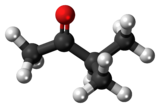This is the current revision of this page, as edited by M97uzivatel (talk | contribs) at 11:51, 18 May 2023. The present address (URL) is a permanent link to this version.
Revision as of 11:51, 18 May 2023 by M97uzivatel (talk | contribs)(diff) ← Previous revision | Latest revision (diff) | Newer revision → (diff)
| |

| |
| Names | |
|---|---|
| Preferred IUPAC name 3-Methylbutan-2-one | |
| Other names Isopropyl methyl ketone, MIPK, 2-Acetyl propane 3-Methyl-2-butanone | |
| Identifiers | |
| CAS Number | |
| 3D model (JSmol) | |
| ChemSpider | |
| ECHA InfoCard | 100.008.423 |
| EC Number |
|
| PubChem CID | |
| UNII | |
| CompTox Dashboard (EPA) | |
InChI
| |
SMILES
| |
| Properties | |
| Chemical formula | C5H10O |
| Molar mass | 86.13 g/mol |
| Appearance | Colorless liquid |
| Odor | Acetone-like |
| Density | 0.803 g/cm (20 °C) |
| Melting point | −92 °C (−134 °F; 181 K) |
| Boiling point | 92 °C (198 °F; 365 K) |
| Solubility in water | 6-8.2 g/L (20 °C) |
| Vapor pressure | 8.6 kPa (20 °C) |
| Magnetic susceptibility (χ) | -58.45·10 cm/mol |
| Refractive index (nD) | 1.389 (20 °C) |
| Viscosity | 0.48 mPa·s (20 °C) |
| Hazards | |
| Flash point | 5 °C (41 °F) |
| Autoignition temperature |
475 °C (887 °F; 748 K) |
| NIOSH (US health exposure limits): | |
| PEL (Permissible) | none |
| REL (Recommended) | TWA 200 ppm (705 mg/m) |
| IDLH (Immediate danger) | N.D. |
| Except where otherwise noted, data are given for materials in their standard state (at 25 °C , 100 kPa).
| |
3-Methyl-2-butanone (methyl isopropyl ketone, MIPK) is a ketone and solvent of minor importance. It is comparable to MEK (Methyl ethyl ketone), but has a lower solvency and is more expensive.
References
- ^ NIOSH Pocket Guide to Chemical Hazards. "#0424". National Institute for Occupational Safety and Health (NIOSH).
- Dieter Stoye (2007), "Solvents", Ullmann's Encyclopedia of Industrial Chemistry (7th ed.), Wiley, pp. 55–56